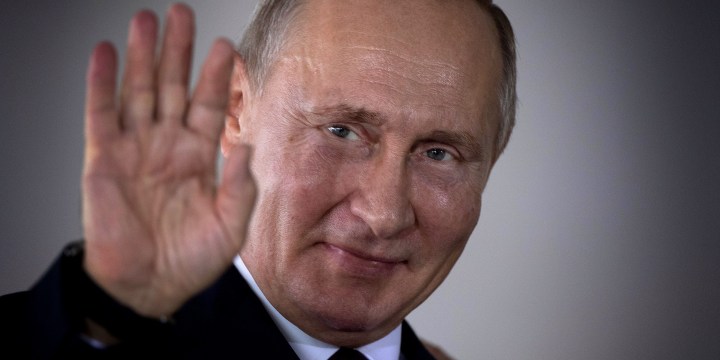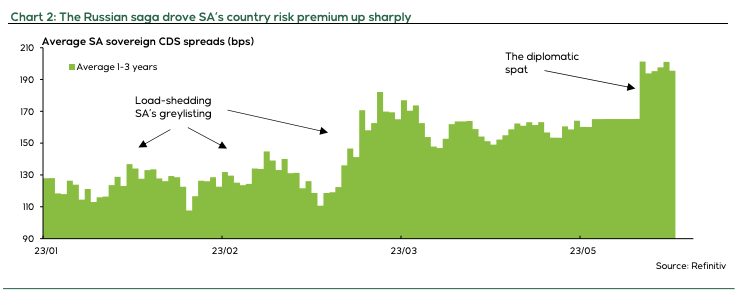BUSINESS REFLECTION
After the Bell: SA’s Russia economic problem is not theoretical; it’s right here, right now

The government doesn’t appear to fully appreciate the extent of the dangers constituted by the hand grenade with which it is now playing chicken.
Most discussions about South Africa’s Russia-leaning, “neutral” stance on the invasion of Ukraine considers in a perambulatory kind of way the potential dangers of alienating the West in favour of an aggressive imperialist — even if that imperialist is allied for the moment with China. There are two points most people seem to be missing.
First, how much the act of leaning toward Russia has affected SA’s economic position right now, today. We are not talking about potential outcomes in the future, we are talking about what is already happening.
Second, the government doesn’t appear to fully appreciate the extent of the dangers constituted by the hand grenade with which it is now playing chicken.
Two reports came out recently that put this all very graphically. The first is the SA Reserve Bank’s financial stability report, which was released last Friday. The report is designed to look at things from a dark point of view to prepare for the worst, but even taking that bias into account, what it suggests really sends shivers down your spine.
For example, it says, if secondary sanctions are imposed on SA, that would “make it impossible to finance any trade or investment flows, or to make or receive any payments from correspondent banks in US dollars”.
Okay, that’s bad enough, but the report goes on to say, “There is also the risk that such sanctions could be expanded to include payments in EUR or GBP. This will be catastrophic for the South African economy and has the undeniable potential to trigger a financial crisis.”
It goes on to discuss various problems, but also points out that SA, “is already plagued by foreign investment outflows as a result of its weak economic conditions and the recent FATF greylisting. Jeopardising remaining investment inflows, which come predominantly from the US, EU, and UK, could therefore lead to financial instability.”
And all of that is only one aspect of the financial stability issue. It also mentions trade, as many reports have already discussed, but there are other potential problems too, including term finance, SA’s foreign reserves and foreign direct investment. The report points out that as at 31 December 2022, 82.5% of foreign direct investment into South Africa originated from the US, EU, and UK, compared to 0.003% from Russia.
It’s plainly obvious if you read the report that the Reserve Bank, no less, is freaked out by the direction SA is taking by cuddling up with the bear. I suspect that SA’s politicians might think, well, sanctions have been imposed on Russia, and they don’t look that bad.
But the problem is that SA’s economic position and Russia’s economic position are not really comparable, because Russia’s oil and gas exports underpin its economy in a way that SA’s mineral wealth does not.
Russia’s pre-invasion income from oil and gas was about $132-billion, and because the world needs this resource so badly, Russia has managed to maintain this economic underpin somewhat, albeit at a lower rate. SA’s total mineral exports, by comparison, are less than a quarter of that, and really don’t constitute resources that the world needs in the same way it needs oil and gas. As for the rest of SA’s exports, alternatives abound.
The immediate, financial effect of SA’s diplomatic gamesmanship was illustrated by a report Nedbank issued this week called The Cost of the Russia Saga. It’s difficult to separate SA’s continuing Eskom woes, rising interest rates, and the “Russia Saga” from each other, but one thing the Nedbank report notes is the sudden increase in the average SA sovereign credit default swap spreads.

Credit default swaps are essentially the cost of insurance debt investors have to pay to insure their bond investments against the potential of default. In the same way that you would have to pay more for your car insurance if you have the completely understandable tendency to drink and drive, so the measure of insurance cost is a good indicator of risk.
The interesting thing about these credit default swaps is that they jumped — I mean really jumped — not in unison now with the rand decline or the interest rate increases, but with the Lady R allegations and revelations.
Of course, once things like that get into the market, further pieces of incremental bad news have a disproportionate effect — hence the rand’s continuing decline, for one thing. There has been some retraction by the SA government in its bear cuddling, as the Nedbank report points out. But the vocal concerns of the International Criminal Court have kept the issue at the front of the news — not just here — and the confusing approach is not helping.
All in all, a more ill-considered, ham-fisted, bungled approach is hard to imagine. DM




















 Become an Insider
Become an Insider
in 2022, America and eleven of her principal allies including Germany, UK and Japan accounted for R839,751,985,095 of South Africa’s exports compared with R311,008,041,852 from the so-called BRIC countries (I have also included Hong Kong and Pakistan). South Africa received R531,844,048,890 of imports from America and eleven of her principal allies while the BRIC countries (including Hong Kong and Pakistan) supplied R503,110,674,748 of imports. What this means is that South Africa runs a whopping R307,907,936,205 trade SURPLUS with American and eleven of her allies but an equally significant trade DEFICIT of -R214,429,794,692 with the BRIC countries (including Hong Kong and Pakistan). These are statistics from the South African government. South Africa exported just R4,622,226,938 to Russia and imported R9,151,312,111 for a trade deficit of -R4,529,085,173. South Africa’s trade deficit with China was -R179,123,009,053. With friends like this, who needs enemies? No wonder the Reserve Bank is worried but why isn’t the government……………?
It’s unlikely that the R/US$ will recover to the levels of recent months. Exchange markets reflect the private sector’s views on the near future, and it does not make for good reading. These rates are weakended as a direct consequence of Ramaphosa’s political actions and is likely to continue to weaken.
Is the private sector locked in with whatever political decisions the Government makes? Worse still, many ANC politicians read these comments and still do nothing. Holding Parliament and the Prez to to account for financial losses must be the way to go, I think.
All concerned South Africans will be checking all media , including the likes of DM in particular, for reliable reports on the major issues confronting us . We all see the constant appeals they need to send out for financial support to pay their way . I never see adverts by the major banks in your posts , apart from ABSA ? Why not ? Surely it makes great commercial sense for the likes of Standard Bank & Nedbank etc to secure advertising amongst a select group of committed South Africans ?
So why don’t they ? Hidden agendas perhaps ?
Was it Dudu Myeni who said “if the Rand falls we will just pick it up”? Maybe that’s the strategy? Simple! So what on earth are we worrying about?